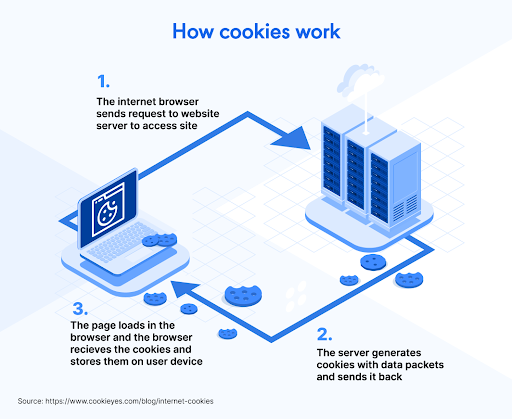Have you ever noticed that after searching for a piece of furniture on a particular website, you suddenly find yourself bombarded with ads for console tables? It can feel a bit like you’re being watched, right? Well, you’re not far off; this is thanks to cookies placed on your computer by websites. So, let’s take a look at this beautiful tin of internet cookies!
First, it’s good to understand what cookies actually are. Simply put, cookies are tiny bits of data sent to and from your browser to help identify you. When you visit a site, your browser sends a little note to its server, and voilà: a cookie is created and stored on your device. These cookies help remember your preferences, like what you want to read, see, or buy.

Think of cookies like a coat check ticket: you hand over your “coat” (data) and receive a “ticket” (cookie) that links back to you. When you return, your browser presents the ticket, and the website retrieves your info by reading the unique ID to piece together your activity, bringing you right back to where you left off, making it feel like you never left.
Most cookies are harmless, as they are designed to enhance your browsing experience. However, some can track you without your knowledge, which is why it is crucial to understand the different types.
There are several kinds of cookies, however, for simplicity, let’s categorize them into two main types: Authentication and Tracking cookies. Authentication cookies remember your login info, making access easier, while tracking cookies monitor your visits over time and help suggest items you might like.
Now, cookies can be further divided into first-party and third-party. Depending on where they come from, some cookies may potentially be more of a threat than others. First-party cookies are created by the website you’re using and are generally safe. Third-party cookies, on the other hand, come from other sites, often for advertising purposes, and can track your browsing across the web. While they don’t directly identify you, they will know a lot about your interests and activities based on your recent web searches and browsing history. This raises privacy concerns, especially regarding user consent, and these cookies are also more susceptible to hacking and data breaches.
Advertisers and data brokers use this information to build detailed user profiles. By analyzing your online activities—such as the websites you visit, the products you view, and the ads you click—companies can infer your preferences, habits, and even demographic information.
Moreover, seemingly anonymous data can sometimes be re-identified. When datasets containing anonymized user information are combined with other data sources, they can reveal identifiable information. For example, correlating browsing habits with data from social media or public records can allow companies to re-establish identities, effectively compromising privacy. A very interesting, and chilling, article about how easy we all are to be identified can be read here.
A notorious type of third-party cookie is the Zombie cookie, which is a type of third-party cookie that is challenging to remove and can reappear even after deletion. Unlike standard cookies, they store backups in multiple locations, allowing dormant copies to respawn once the original is deleted. This poses a serious privacy risk, as they can track your browsing habits across various websites using cookie syncing, linking your user ID for comprehensive data collection, which is often sold to companies for targeted advertising.
These cookies invade your privacy by monitoring your online activities without consent and are designed to evade deletion, making it difficult to protect your privacy. Companies gather detailed browsing information for marketing purposes, and in some cases, hackers can fabricate these cookies to infect your system with malware.
The good news? Data privacy laws now require some sites to ask for your permission to use cookies, giving you more control. Still, many of us click “accept” just to get rid of annoying pop-ups, allowing sites to track our actions. Be especially cautious when you accept cookies on public Wi-Fi, as hackers may exploit these connections to inject malicious code disguised as cookies.
In summary, while cookies can enhance your online experience, some pose cybersecurity risks. You can always choose to disable cookies and see how it impacts your browsing. Ultimately, it’s all about making informed decisions! After all, a bad cookie can ruin a bright day!
